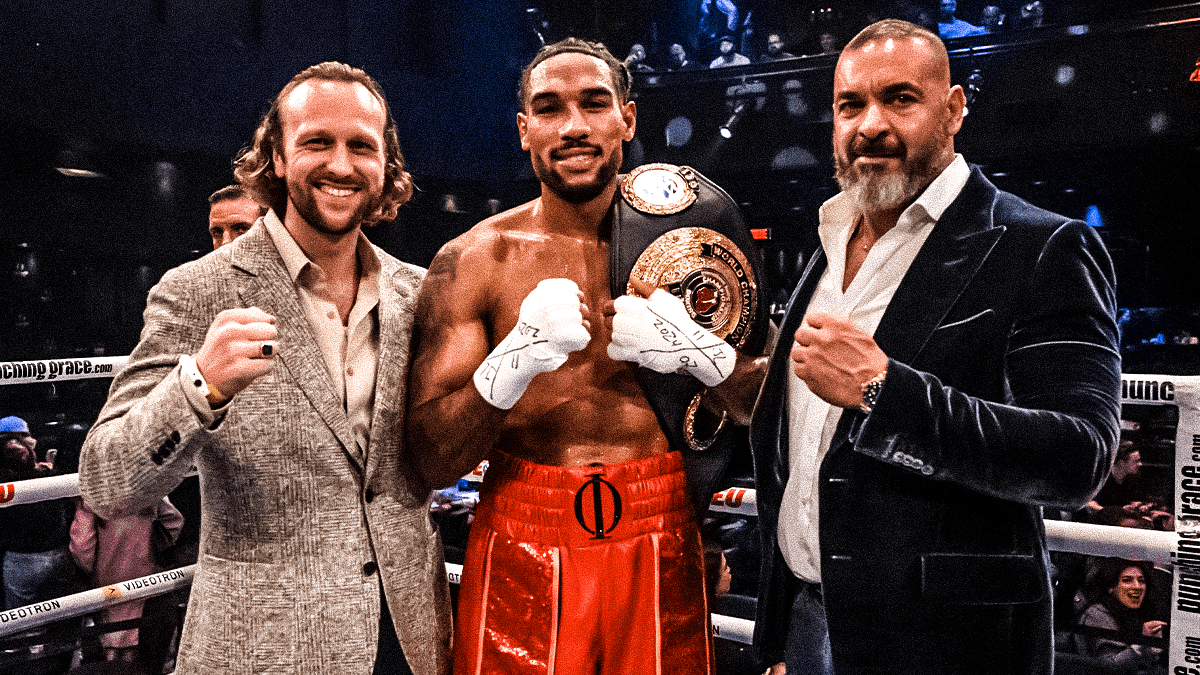I’ve seen former world champions driving Rolls-Royces… and others begging on the street.
More often than not, the difference isn’t just talent or luck — it comes down to one crucial element: the team around you. Some people lift you up; others drag you down. In a sport as unforgiving as boxing, every decision matters. You need to know when to build and when to step back. And to do that, having good advice is often essential.
In Quebec, we’re relatively lucky. I’ve been involved in the world of professional boxing for nearly twenty years. I’ve had the privilege of seeing it from all angles: as a matchmaker, trainer, cutman, and behind the scenes. And if there’s one role that still raises a lot of questions, it’s that of the professional boxer’s manager.

Photo: NY Times – Andre Berto, Al Haymon and Floyd Mayweather Jr
Manager or Advisor? An Important Distinction
First, we need to clarify two terms that are often (wrongly) used interchangeably: “manager” and “advisor.”
Historically, a manager was much more than just a contract negotiator. He would house the boxer, provide a monthly allowance, cover training costs (massage therapy, physiotherapy, equipment, etc.), find sponsors, and manage the boxer’s career in a concrete and proactive way. He invested time, money, and energy. In return, he would take a significant share of the boxer’s purse (usually around 25%), which was justified given everything he provided.
Today, things have changed. Many so-called “managers” no longer do this kind of in-depth work. They don’t offer material, logistical, or financial support and often act only as contractual intermediaries or representatives during negotiations. That’s why, personally, I prefer the term “advisor” rather than “manager” in many cases.

Photo: FF Unite – Keith Connolly and Edgar Berlanga
Manager, Advisor, Promoter: Who Does What?
In professional boxing, it’s essential to understand who plays what role. The manager is supposed to look after the boxer’s overall interests: planning their career, negotiating contracts, protecting their rights, and anticipating risks. The advisor, meanwhile, tends to play a more occasional or peripheral role — offering advice, guiding certain decisions, sometimes acting as an intermediary, but without the same level of involvement or contractual responsibility.
The promoter is the main organizer of boxing events. They put on the shows, fund the purses, ensure media exposure, and assume the financial risks of the fights. They must deliver quality entertainment while ensuring the athletes they showcase are progressing appropriately.
The relationship between promoter and boxer is clearly interdependent: the promoter needs the boxer to sell tickets, and the boxer needs the promoter to advance their career. A good promoter creates opportunities, but it’s not their job to manage the boxer’s day-to-day — that’s where the manager’s role becomes crucial.
That said, don’t get it twisted: when a promoter invests in a boxer, it’s in their best interest to ensure the athlete develops under the best possible conditions to reach their goals. It’s about protecting their investment.
Although no model is perfect, in Quebec — contrary to popular belief — professional boxers under contract are, by and large, treated very well.
Understanding these distinctions prevents many misunderstandings. Too often, young boxers confuse these roles, sign with the wrong person… and pay dearly for it.

Photo: Vincent Ethier – Antonin Décarie, Karim Bouzidi, Albert Ramirez and Camille Estephan
Two Very Different Realities
Let’s be clear: there are still exceptional managers out there — ones who fight tooth and nail for their boxers, who support them through tough times, who are there daily, helping build a long-term career. Some don’t even take a dime until the boxer earns money. They do it out of passion, loyalty, or belief in their potential. These managers deserve respect and recognition — they represent what the role is meant to be.
But on the flip side, there are also people taking outrageous percentages without offering any real support, presence, or vision. This imbalance has caused confusion among athletes, fans… and even promoters.
And then there’s the glaring inconsistency: the trainer — who spends every day with the athlete, through the highs, lows, injuries, and self-doubt — usually earns 10% of the purse. So how is it logical that a manager or advisor, often far less involved, receives 15%, 20%, or even 25%? That’s a question more boxers should ask before signing.
A Role That Needs Redefining
The manager’s role should be clear: protect the boxer contractually, ensure they get what they deserve, that they’re treated fairly by promoters, and that their career path makes sense. A manager must know when to say no to bad fights, anticipate legal issues, and foster trust and transparency.
But if you want to earn a significant share of the purse — whether it’s 15%, 20%, or 25% — you have to be willing to invest. Help the athlete perform. Guide them in their career decisions. Be there in the good times — and especially in the bad.

Photo: Vincent Ethier – Benedikt Poelchau, Osleys Iglesias and Camille Estephan
Conclusion
This text isn’t meant to discredit anyone, but to shed light on a reality many people don’t know. Not all managers are the same, and not all fulfill the same role. Some change lives; others take without giving.
It’s time to restore dignity to this profession. A good manager is an invaluable asset to a boxer. They deserve recognition — even celebration. But let’s also call it like it is: if you don’t invest, aren’t present, and don’t build anything… you’re probably not a manager. You’re an advisor — and that’s perfectly fine, as long as the roles are clear.



